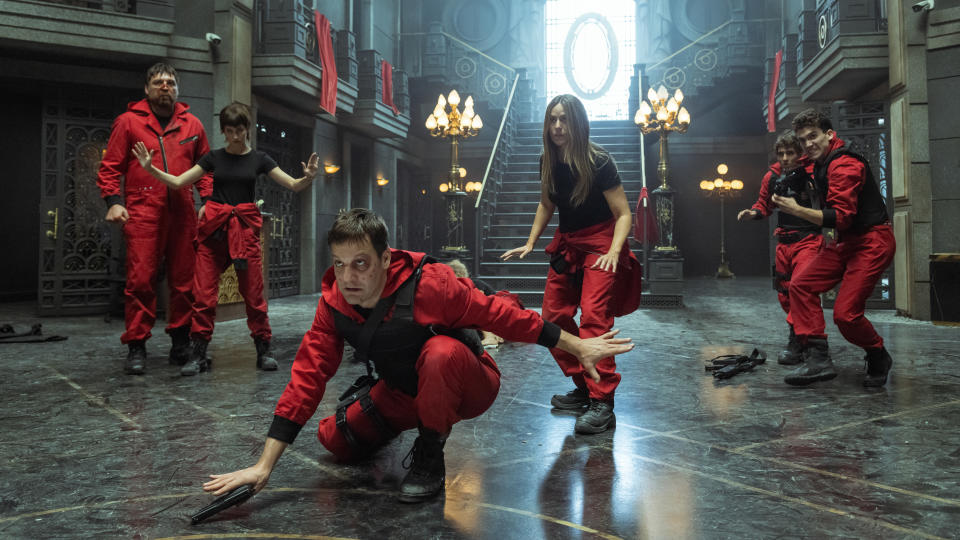How Larry Tanz, Netflix’s VP Of Original Series For EMEA, Is Radically Expanding The Streamer’s Web Of Inclusivity
- Oops!Something went wrong.Please try again later.

When Netflix lured Larry Tanz from Michael Eisner’s digital studio Vuguru in 2014 to head up its content acquisition in Europe, the streamer’s regional presence was no more than a little townhouse on a canal in Amsterdam. Seven years and one pandemic later, the exec, who is now VP of Original Series for EMEA, is making shows in 20 different countries, with people on the ground in London, Madrid, Berlin, Rome and Paris to name a few.
“It’s just an entire transformation,” says Tanz, speaking via Zoom from a hotel in Paris. “Back then, we weren’t even doing original content outside of the U.S. and we were just starting our U.S. original content. It’s just been amazing journey.”
More from Deadline

Netflix
Indeed, it has. Netflix is now reputed for being a major driving force behind breaking language barriers with its strong European offerings and has had a string of hit titles crossover and connect with U.S. audiences. French mystery thriller Lupin, starring Omar Sy, became the first French series to make it into Netflix’s top ten list in the U.S. and ranked number one in various territories, reaching a reported 76 million viewers. Spanish drama La Casa de Papel, better known as Money Heist, was gobbled up by international audiences during lockdown, reaching 65 million viewers and spawning five series. German programs such as big-budget neo-noir Babylon Berlin and sci-fi thriller Dark have captivated global audiences, with the latter becoming the streamer’s third most-watched international series in America. Meanwhile, French comedy Call My Agent! crossed borders and has several remakes for the program in the offing.
“What we’re seeing as we become more local and closer to the local creative communities with local executives, is that we just get better at making shows that are more specific and more relevant, and so we’ve seen all of these big successes like Lupin,” says Tanz. “So, it’s really about that evolution we’ve had of going from a little townhouse, making and commissioning shows out of LA, to specific country teams and offices commissioning local shows locally.”
The expansion has been striking to say the least, and captive audiences during the pandemic tapped into the fact that Netflix’s library was much deeper than a mere glance at the recommended titles list. Global viewing of non-English titles by Netflix members doubled in 2020 compared to the previous year. Suddenly, it seemed there was a whole new slate for audiences to binge-watch.

Tamara Arranz/Netflix
Tanz is proud that the international success of these titles has been driven by the performance of local content in its own market. That, he says, has been a key objective for developing Netflix’s EMEA content. “When we’re making or commissioning these shows, we’re really almost explicitly saying, don’t make us a Spanish show for the world, don’t make us a Turkish show for the world, and definitely not for the U.S. Make it so that it’s going to be the best show for the local market, like Germany or France,” he says, emphasizing the importance of authenticity of local stories in their marketplace. “For example, we have a show called Snabba Cash from Sweden,” says Tanz. “It’s an awesome show and when we first looked at it, we thought, OK, how can this show travel? But then we got into it, and we thought, let’s just make this show the best show ever in Sweden, and it’s been a huge success for us there. But it also happened to get watched outside of Sweden as well. I’d say that that is one important North Star for us: local impact and local authenticity. It shouldn’t feel like someone from outside came into your culture and made a show in your country.”
This ethos is a major factor for how Tanz and his team have approached growth in the EMEA region. He’s honest and humble enough to admit that Netflix can’t do it alone and pleasing its members and attracting new ones is largely dependent upon aligning themselves with the best local production teams in each territory.
“The way that we can be most effective is by being on the ground, commissioning and building relationships with producers,” says Tanz. “It’s interesting because in Europe, the Middle East and Africa, it’s a different approach to making content than in the U.S. We really partner with producers on a creative level and we’re not making all of these shows ourselves. We are actually making them with great local producers. It’s a much different relationship from the traditional Hollywood studio model where you sort of do everything yourself. Here, it’s quite the opposite. We’re entirely working with local producers, so we rely on them for the execution but also for help in sourcing and developing great creative ideas.”
Additionally, Tanz feels a responsibility to contribute to regional infrastructure when making local content. He points to upcoming multilingual period mystery-horror series 1899, which is made by Dark creators Jantje Friese and Baran bo Odar (the duo inked a significant overall deal with Netflix in 2018 that sees them exclusively create projects for the streamer for an initial five-year period). The show was filmed at Studio Babelsberg in Germany on a brand new, state-of-the-art ‘virtual production’ facility known as a ‘Volume’. The 4,500sqft stage is similar to the technology used on Disney’s The Mandalorian and is surrounded by an LED backdrop that is rendered in a video game engine (Unreal Engine) in real time, moving with the camera to create a realistic background and sky that creates the illusion of shooting outdoors and across different locations. It’s ground-breaking tech that also reduces the post-production process. Netflix backed the project along with various sources including the Investment Bank of Brandenburg, and also committed to shoot multiple series on the stage. “It’s a good example of how we can enable creators to do their best work and their most ambitious work but also contribute to the local ecosystem,” he says.
And while Netflix has solid footprints in major European markets such as Spain, France and Germany, what market is Tanz most looking forward to developing content in? “The one I’m very excited about right now is Russia,” he says, pointing to ANNA K, a contemporary reimagining of Leo Tolstoy’s iconic novel Anna Karenina. It’s Netflix’s first-ever Russian original drama series and the streamer will partner with Moscow-based 1-2-3 Production for the project.
Having recently returned from a trip to Russia, Tanz says, “There’s so much enthusiasm and energy around tapping into their great, great storytelling tradition. There’s so much we can do there and we heard so many great pitches and met so many great writers and producers.”
Russia has an extremely dynamic local VOD ecosystem, which saw a huge increase in appetite for content in the wake of the pandemic, but Tanz says this infrastructure has been a real plus in terms of Netflix entering the space in that consumers in the territory understand the streaming business. “It’s really hard to explain streaming to new markets and help people figure out how to get it on their TV and all of the groundwork that you might have to lay in another market, say, like some of the markets in the Middle East. But in Russia you don’t have to do that and it’s a big advantage. We’re happy to compete head-to-head based on our content. I think our global catalogue is what differentiates us there and the local content we’re just about to start producing there.”
<img class="wp-image-1234784765" src="https://deadline.com/wp-content/uploads/2021/07/060721-CannesDisruptors-Cover.jpg?w=819" alt="Larry Tanz is included in Deadline’s 2021 class of Disruptors in our Cannes print magazine. Click here to read the digital edition." width="250" height="313" srcset="https://deadline.com/wp-content/uploads/2021/07/060721-CannesDisruptors-Cover.jpg 3000w, https://deadline.com/wp-content/uploads/2021/07/060721-CannesDisruptors-Cover.jpg?resize=120,150 120w, https://deadline.com/wp-content/uploads/2021/07/060721-CannesDisruptors-Cover.jpg?resize=240,300 240w, https://deadline.com/wp-content/uploads/2021/07/060721-CannesDisruptors-Cover.jpg?resize=819,1024 819w, https://deadline.com/wp-content/uploads/2021/07/060721-CannesDisruptors-Cover.jpg?resize=1229,1536 1229w, https://deadline.com/wp-content/uploads/2021/07/060721-CannesDisruptors-Cover.jpg?resize=1638,2048 1638w, https://deadline.com/wp-content/uploads/2021/07/060721-CannesDisruptors-Cover.jpg?resize=48,60 48w, https://deadline.com/wp-content/uploads/2021/07/060721-CannesDisruptors-Cover.jpg?resize=352,440 352w, https://deadline.com/wp-content/uploads/2021/07/060721-CannesDisruptors-Cover.jpg?resize=150,188 150w, https://deadline.com/wp-content/uploads/2021/07/060721-CannesDisruptors-Cover.jpg?resize=110,138 110w, https://deadline.com/wp-content/uploads/2021/07/060721-CannesDisruptors-Cover.jpg?resize=285,356 285w, https://deadline.com/wp-content/uploads/2021/07/060721-CannesDisruptors-Cover.jpg?resize=192,240 192w, https://deadline.com/wp-content/uploads/2021/07/060721-CannesDisruptors-Cover.jpg?resize=320,400 320w, https://deadline.com/wp-content/uploads/2021/07/060721-CannesDisruptors-Cover.jpg?resize=384,480 384w, https://deadline.com/wp-content/uploads/2021/07/060721-CannesDisruptors-Cover.jpg?resize=640,800 640w, https://deadline.com/wp-content/uploads/2021/07/060721-CannesDisruptors-Cover.jpg?resize=480,600 480w, https://deadline.com/wp-content/uploads/2021/07/060721-CannesDisruptors-Cover.jpg?resize=800,1000 800w, https://deadline.com/wp-content/uploads/2021/07/060721-CannesDisruptors-Cover.jpg?resize=614,768 614w, https://deadline.com/wp-content/uploads/2021/07/060721-CannesDisruptors-Cover.jpg?resize=1024,1280 1024w, https://deadline.com/wp-content/uploads/2021/07/060721-CannesDisruptors-Cover.jpg?resize=1280,1600 1280w" sizes="(max-width: 250px) 100vw, 250px" />
And while the content industry sits on the precipice of the streaming wars, Tanz is optimistic about the future and remains thoughtful about where the next wave of creative voices will come from. “We feel good that we’re running in the right direction,” he says. “It’s not a ‘winner takes all’ game for us. When we look at the total share of all of entertainment and TV viewing, we’re kind of a small piece of it, so there’s a lot of room for multiple players to grow.” He adds: “There’s a lot of demand for great stories and what excites me about that is we have an opportunity in this region in particular to help build and develop the next generation of storytellers. And we can do that from the ground up in a diverse and inclusive way. We don’t have that issue Hollywood does about people getting seats at the table. We’re building tables with seats that we get to help fill up.”
Best of Deadline
Broadway Returns: A Complete, Updated Roster Of Opening Dates, Venues And How To Buy Tickets
U.S. Covid-19 Update: More Transmissible Delta Variant Now 20% Of New Cases; Kids Most At Risk
Summer Premiere Dates For New & Returning TV Series On Broadcast, Cable & Streaming
Sign up for Deadline's Newsletter. For the latest news, follow us on Facebook, Twitter, and Instagram.

